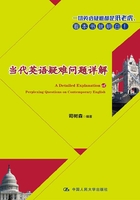
15 副词almost修饰名词的情况并不罕见
问:在张道真老师编著的《现代英语用法词典》(A Dictionary of Current English Usage)almost项下有这样一段叙述:(almost)在修饰动词、形容词、副词、名词时,almost和nearly常可换用,但在和no、none、nothing、never连用时,可用almost,而不能用nearly。我的问题是:almost既然是副词,怎么能修饰名词呢?它是否有什么特殊用法?上述提法是否有误?请给予解释。
答:我们知道,副词在句子中的主要功能是用作状语,修饰动词、形容词、副词或整个句子。例如:
(1)You must be able to speak fluently and correctly.
(2)The very small boy threw the ball quickly.
(3)We get on extremely well with our neighbours.
(4)Hopefully we can get this done before dark.
但副词的语法功能并不仅限于此,它还可以修饰某些不定代词、数词、小品词和介词,当然也可以修饰名词,甚至直接置于名词之前用作定语。例如:
(5)Nearly(Almost)everybody came to our party.
(6)We counted approximately the first thousand votes.
(7)They left her well behind.
(8)He made his application well within the time.
(9)He has inside information about the talks.
(——也有权威词典认为这里的inside是形容词)有些副词如here, there等还可直接置于名词之后作定语,例如:
(10)The factory there produces modern furniture.
《现代英语用法词典》所述并不错,如权威词典OALD也有类似叙述并有例句:
(11)It’s almost time to go.
但就almost用作副词时能否直接置于名词之前作定语也确实存有不同见解。有人认为almost用作副词时通常不能直接修饰名词,如不说“Almost students passed the examination in English”而应说“Almost all the students passed…”或者说“Almost every student passed…”,还有人和权威词典认为almost也可用作形容词即作定语直接修饰名词,例如:
(12)His almost smile disappeared.
(13)It was an almost certainty that he would be the winner.
(14)…, no longer with awe(敬佩)for the educated man, for the doctor, for the almost gentleman.
(15)The lips were full, yet possessed of the firmness, almost harshness, which is characteristic of thin lips.
但对此用法也见解不一,有人认为这是古旧用法的重新流行,有的人认为不够严谨,有的人认为是书面语,有的人认为这是一种古怪用法,但在G. Greene,Jack London,Hawthorne,Coleridge,Thackeray等英美作家和诗人的作品中均可见到类似的用法。我们主要应该掌握常用词汇的通常规范用法,但也应该在不断发展变化的实际语言中观察、见识新的语言现象和学习新的词语用法。应该知道,almost在和no、none、nothing、never连用时,应再加上any、nobody和nowhere,可用almost,而不能用nearly。例如:
(16)Almost any bus will do.
(17)You can find the meaning of almost any word here.
(18)Almost nobody believed her.
应该注意的是,almost在与否定词no、none、nobody、never等连用时,也可用“hardly(或scarcely)+非否定词(any、anybody、ever等)”结构来代替,而且后者更为常用。例如:Hardly anybody came to the party比Almost no one came to the party更为常用,We hardly ever go to the movies比We almost never go to the movies 更为常用。此外,程度副词(adverbs of degree)almost和largely、nearly、really、virtually几乎总是置于主要动词之前(连系动词除外),而程度副词altogether、enormously、hard、outright、somewhat、tremendously和well却几乎总是置于主要动词之后。例如:
(19)The president of the European Commission largely ignored the British conditions.
(20)Spear says she admires Lloyd’s tremendously.
(21)The new database will help horse breeders enormously.(新的资料库将给马匹育种者带来极大的帮助。)